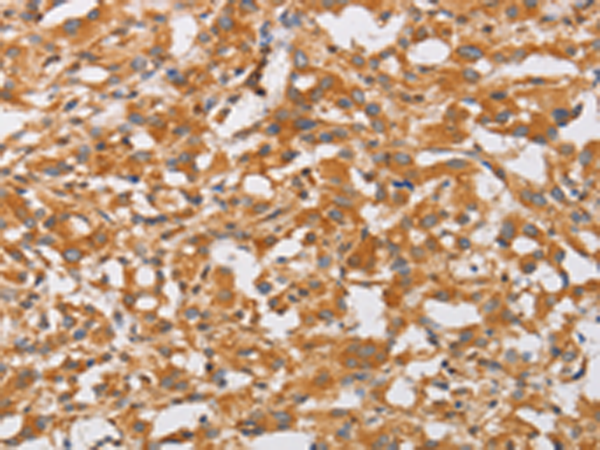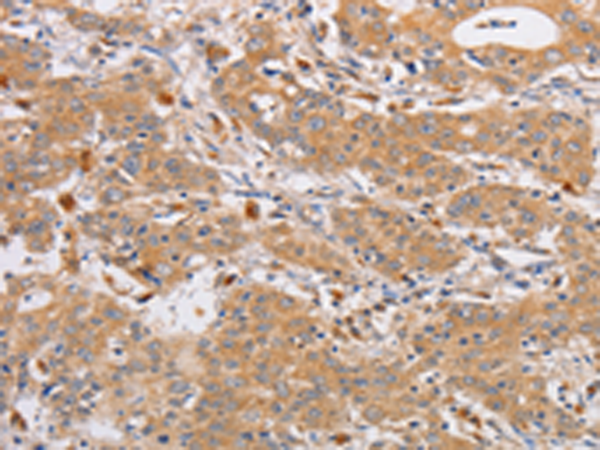


| WB | 咨询技术 | Human,Mouse,Rat |
| IF | 咨询技术 | Human,Mouse,Rat |
| IHC | 1/50-1/200 | Human,Mouse,Rat |
| ICC | 技术咨询 | Human,Mouse,Rat |
| FCM | 咨询技术 | Human,Mouse,Rat |
| Elisa | 1/1000-1/2000 | Human,Mouse,Rat |
| Aliases | LOX1; LOXIN; SLOX1; CLEC8A; SCARE1 |
| WB Predicted band size | 31 kDa |
| Host/Isotype | Rabbit IgG |
| Antibody Type | Primary antibody |
| Storage | Store at 4°C short term. Aliquot and store at -20°C long term. Avoid freeze/thaw cycles. |
| Species Reactivity | Human |
| Immunogen | Fusion protein of human OLR1 |
| Formulation | Purified antibody in PBS with 0.05% sodium azide and 50% glycerol. |
+ +
以下是关于OLR1(氧化低密度脂蛋白受体1)抗体的3篇文献摘要,供参考:
---
1. **文献名称**: *LOX-1 in atherosclerosis: biological functions and pharmacological modifiers*
**作者**: Mehta JL, Chen J, Hermonat PL.
**摘要**: 本文综述了LOX-1(OLR1)在动脉粥样硬化中的作用,重点讨论了其作为氧化低密度脂蛋白(ox-LDL)受体的功能,以及通过特异性抗体阻断LOX-1可减少炎症细胞浸润和斑块形成的机制。
2. **文献名称**: *A neutralizing antibody targeting oxidized LDL receptor 1 alleviates endotoxemia-induced liver injury*
**作者**: Kataoka H, Kume N, Miyamoto S, et al.
**摘要**: 研究报道了一种靶向OLR1的中和抗体,能够抑制内毒素血症模型中肝脏炎症反应,通过阻断ox-LDL与OLR1的结合,减轻肝细胞凋亡和氧化应激,提示其潜在治疗价值。
3. **文献名称**: *LOX-1 as a novel therapeutic target in breast cancer*
**作者**: Ghosh R, Smith SA, Mohanraj L, et al.
**摘要**: 该研究揭示了OLR1在乳腺癌细胞中的高表达,并通过特异性抗体抑制OLR1信号通路,显著降低肿瘤细胞的增殖和迁移能力,表明OLR1抗体可能成为癌症治疗的潜在工具。
---
以上文献均聚焦于OLR1抗体的生物学功能或治疗应用,涵盖心血管疾病、炎症及癌症领域。如需具体文献来源,可进一步通过PubMed或期刊数据库查询。
The OLR1 antibody targets the oxidized low-density lipoprotein receptor 1 (OLR1), also known as LOX-1. a transmembrane glycoprotein primarily expressed on endothelial cells, macrophages, and vascular smooth muscle cells. Discovered in 1997. LOX-1 functions as a scavenger receptor that binds oxidized LDL (oxLDL), a key player in atherosclerosis. By mediating oxLDL uptake, LOX-1 contributes to endothelial dysfunction, foam cell formation, and plaque progression, linking it to cardiovascular diseases. It also interacts with other ligands, such as apoptotic cells and bacteria, implicating it in inflammation and immune responses.
OLR1 antibodies are widely used in research to study LOX-1's expression, localization, and role in pathologies like atherosclerosis, hypertension, and diabetes. Elevated LOX-1 levels are associated with oxidative stress, pro-inflammatory signaling, and endothelial injury, making it a biomarker for vascular damage. Therapeutic strategies targeting LOX-1. including neutralizing antibodies, aim to inhibit oxLDL uptake and downstream inflammatory pathways. Recent studies explore OLR1 antibodies in preclinical models to attenuate atherosclerosis and ischemia-reperfusion injury. However, clinical applications remain experimental, with ongoing research focused on optimizing specificity and delivery. Understanding LOX-1's dual roles in lipid metabolism and inflammation continues to drive interest in OLR1 antibodies as both diagnostic and therapeutic tools.
×